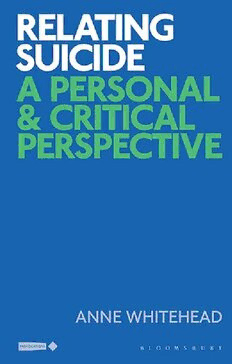
Relating Suicide: A Personal and Critical Perspective PDF
129 Pages·2023·7.238 MB·English
Most books are stored in the elastic cloud where traffic is expensive. For this reason, we have a limit on daily download.
Preview Relating Suicide: A Personal and Critical Perspective
Description:
Suicide is seen as exceptional: it is unusual, it results from a pathological state of mind, and it is associated with extraordinary individuals. In reality, suicide is woven into the everyday places that we inhabit, and is more commonplace than we like to think. Writing against the prevailing conception of suicide as exceptional, Whitehead argues that it should be brought in to the ordinary and that its 'ordinariness' is worthy of attention precisely because it helps us to understand and relate to it. By turns provocative and deeply affecting, this book brings suicide into conversation with the critical medical humanities, extending beyond individual pathology and the medical institution to think about subjective and social perspectives, and to open up the various sites, scenes and interactions with which suicide is associated.Suicide is relatable in that we can identify with it as well as tell its story, and this book does both. Combining critical and textual analysis with personal reflection based on the author’s own experience of her sister’s suicide, it interrogates how suicide comes to matter and asks whether some bodies are seen to matter more than others.
See more
The list of books you might like
Most books are stored in the elastic cloud where traffic is expensive. For this reason, we have a limit on daily download.
